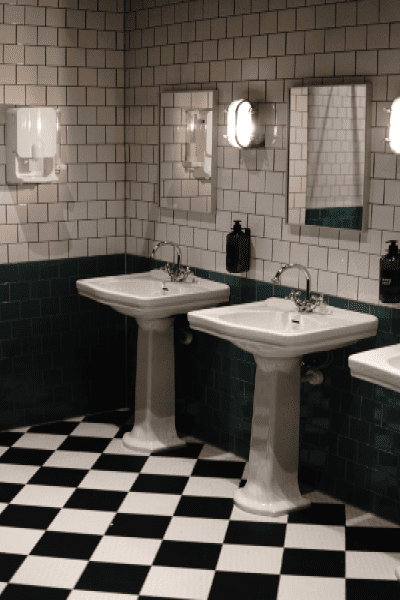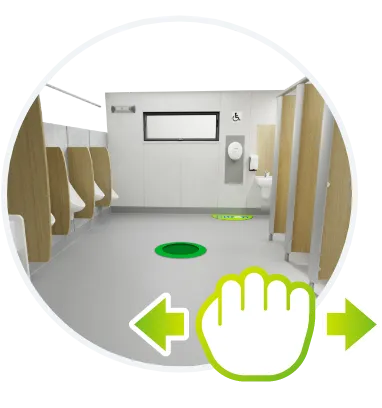In the 21st century, it’s easy to take public washrooms and toilets for granted. Whether in the workplace or in a restaurant, we expect every building to have some sort of facility we can use when we need to go.
However, it’s not always been this way. For thousands of years, our ancestors would either do their essential business in cramped and dirty rooms with poor sanitation, or in the great outdoors. Death from waterborne diseases was common and, in big cities, the stench and filth was said to be unbearable in hot weather whilst basic amenities such as soap and toilet paper weren’t available. In Ancient Rome, public bathrooms (benches with holes in them to act as seats) could only be used by men. This meant women stayed close to the home or avoided eating and drinking in public for fear that may have to go.
It wasn’t until 1851 that the very first public toilets with actual toilet seats and flushing capabilities were introduced whilst women had to wait another 100 years before the introduction of the first sanitary bin.
So washrooms have changed immensely over the years. And the way in which we use washrooms has changed too. From how we decide what toilet cubicle to use to what we use the washroom for, our habits and behaviours are certainly weird and wonderful and we take a look at some of them in more detail in our blog.
Table of Contents
Washroom Behaviour Psychology
Why Do People Avoid Washrooms?
We may not realise it but there’s a strong correlation between people’s emotions and washroom behaviour. From being anxious about using the toilet in certain situations or when there are other people around to being disgusted at the state of washroom hygiene, individuals will avoid washrooms if there are associated negative emotions, showing just how important it is to provide high standards of washroom hygiene. Bad washroom hygiene is enough to put people off using the toilet even when they have to go and complaints include nasty odours, overall cleanliness, no toilet paper, no soap or people not flushing the toilet after use! Consistently delivering a hygienic and pleasant washroom experience can help to turn negative emotions into positive ones.
Which Toilet Cubicle Do People Use?
Deciding which toilet cubicle to use is based on what an individual thinks will be the cleanest and most hygienic stall – which is usually the one that people think is used the least. Recent research has found that females frequent the first cubicle the least making this one the cleanest whilst men tend to go for the cubicle that’s nearest making the stalls further away more hygienic.
Women Spend Longer on the Toilet
There have been several studies that have found women spend longer on the toilet than men – this may be the reason for the longer queues! Not only this but women are less likely to sit on the bare toilet seat, either crouching or putting paper on the seat to do their business as they find the seat unclean and unhygienic.
Hand Hygiene Habits
When it comes to handwashing – 84% of people don’t do it effectively to properly remove germs and bacteria whilst people have been found to tell little fibs about whether they even wash their hands at all! Promoting handwashing through signs can be a way of making sure people are washing their hands properly in addition to providing the basics such as hand dryers, paper towel dispensers and soap and sanitising solutions.
Whilst people may not wash their hands properly, as humans we are still conscious about touching washroom surfaces that may be thought of as unhygienic such as door handles and toilet flushes.
Do people Prefer Hand Dryers or Paper Towels?
The age-old debate: do people prefer to use hand dryers or paper towels? A lot of research has been conducted in this area and the findings can have an effect on what individuals prefer to use and in fact can lead to people not drying their hands at all. Previous studies suggest that hand dryers are less hygienic however with more faster, environmentally friendly options on the market, neither one may be better or worse than the other.
Regional workplace toilet habits
A recent study actually found some surprising results about how we in the UK treat our toilet time and, strangely, it varies from region to region. The study by Protecting.co.uk found that the time taken on the throne varies hugely between urban centres. The study found that workers in London take around 28 minutes to go about their business, but the same act takes just over 4 minutes in Birmingham.
But the average human takes just over 2 minutes to have a bowel movement, with most of that time spent adjusting clothing or cleaning up afterwards. So why the huge disparity?
Time spent on the toilet
When looking at the figures, it looks like those more dynamic centres of business are where more time is spent on the toilet.
Aberdeen – 6 minutes, 48 seconds
Birmingham – 4 minutes, 45 seconds
Cardiff – 8 minutes, 15 seconds
Leeds – 14 minutes, 50 seconds
London – 28 minutes, 35 seconds
Manchester – 12 minutes, 10 seconds
Newcastle – 5 minutes, 55 seconds
Southampton – 10 minutes, 20 seconds
It might be a reflection of the culinary scene in London, or maybe it’s that the only place to get peace and quiet is on the toilet. But, at 28 minutes, workers in London spend twice as long on the throne as those in the next highest entry, Leeds.
Take a look around…
Use our virtual washroom to see how our solutions will elevate your washroom experience
Why are people spending so long on the toilet?
According to one source, Leeds is one of the UK’s largest hubs of finance, outside of London, and Manchester too is one of the most dynamic centres of business. So perhaps this high flying and high-pressure environment explains the need for some peace and quiet. Whatever the reasons, one thing is for sure, you’re unlikely to be disturbed or distracted by co-workers while you’re spending time in a toilet cubicle.
So, what are people really doing in the toilet for nearly half an hour?
Several sources show that over 50% of people take time to respond to emails or text messages when on the toilet. Between 30-40% use the time to either surf the internet or browse their social media. And, around 63% of people read books, magazines or other printed material while on the throne.
Toilet reading
With all that undisturbed time, it’s no surprise that one of the favoured things to do on the toilet is read. Although today most people don’t visit the toilet without a book, newspaper or smartphone, this isn’t a new development.
Historically, catching up with your reading has been a toilet pastime since at least the days of the Romans. In fact, the Romans used to keep a library of scrolls outside bath houses for visitors to catch up on their reading.
In the modern age, newspapers became a portable and affordable reading option and, in depression era America, they were also used as toilet paper. Today, you’ll even find novelty toilet paper with jokes, stories or other anecdotes printed on it.
Spending time on mobile phones
But of course, these days everyone has a smartphone to hand, and therefore a huge library to call on. From news or gossip sites, to e-book readers, finding time to catch up on global events or read a chapter or two of your book is easily done. And with that smart device probably in your pocket, it’s easy to lose ten or fifteen minutes catching up on the news.
In the 1980s, the thought of someone on the phone while on the toilet would probably conjure up images of a businessman cutting deals from their cubicle. Today one in 20 people admit to taking a phone call while sat on the toilet. And they’re probably not closing business deals…
Hopefully you wash your hands thoroughly after visiting the toilet, but can we do the same with our phones? It’s been estimated that the average smartphone is actually ten times dirtier than a toilet seat, and the toilet probably gets cleaned more often!
Contact Citron Hygiene
With people spending more time on the toilet or avoiding toilets for a number of reasons, it’s more important than ever before to provide a pleasant washroom environment that is both clean and hygienic with all the essentials such as toilet paper, soap, hand dryers and paper towels. Citron Hygiene provide a range of hygienic washroom solutions that can help you deliver the best experience to your customers and visitors.
Contact Citron Hygiene using the form below or call our friendly team on 08000 66 55 52 to find out more.

